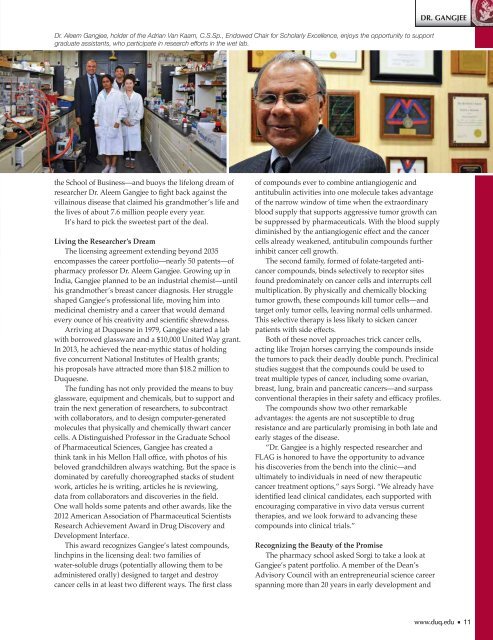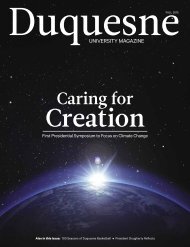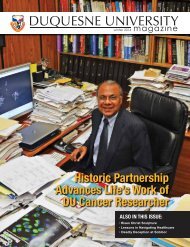2014-Winter-DU-Magazine
2014-Winter-DU-Magazine
2014-Winter-DU-Magazine
You also want an ePaper? Increase the reach of your titles
YUMPU automatically turns print PDFs into web optimized ePapers that Google loves.
Dr. Aleem Gangjee, holder of the Adrian Van Kaam, C.S.Sp., Endowed Chair for Scholarly Excellence, enjoys the opportunity to support<br />
graduate assistants, who participate in research efforts in the wet lab.<br />
DR. GANGJEE<br />
the School of Business—and buoys the lifelong dream of<br />
researcher Dr. Aleem Gangjee to fight back against the<br />
villainous disease that claimed his grandmother’s life and<br />
the lives of about 7.6 million people every year.<br />
It’s hard to pick the sweetest part of the deal.<br />
Living the Researcher’s Dream<br />
The licensing agreement extending beyond 2035<br />
encompasses the career portfolio—nearly 50 patents—of<br />
pharmacy professor Dr. Aleem Gangjee. Growing up in<br />
India, Gangjee planned to be an industrial chemist—until<br />
his grandmother’s breast cancer diagnosis. Her struggle<br />
shaped Gangjee’s professional life, moving him into<br />
medicinal chemistry and a career that would demand<br />
every ounce of his creativity and scientific shrewdness.<br />
Arriving at Duquesne in 1979, Gangjee started a lab<br />
with borrowed glassware and a $10,000 United Way grant.<br />
In 2013, he achieved the near-mythic status of holding<br />
five concurrent National Institutes of Health grants;<br />
his proposals have attracted more than $18.2 million to<br />
Duquesne.<br />
The funding has not only provided the means to buy<br />
glassware, equipment and chemicals, but to support and<br />
train the next generation of researchers, to subcontract<br />
with collaborators, and to design computer-generated<br />
molecules that physically and chemically thwart cancer<br />
cells. A Distinguished Professor in the Graduate School<br />
of Pharmaceutical Sciences, Gangjee has created a<br />
think tank in his Mellon Hall office, with photos of his<br />
beloved grandchildren always watching. But the space is<br />
dominated by carefully choreographed stacks of student<br />
work, articles he is writing, articles he is reviewing,<br />
data from collaborators and discoveries in the field.<br />
One wall holds some patents and other awards, like the<br />
2012 American Association of Pharmaceutical Scientists<br />
Research Achievement Award in Drug Discovery and<br />
Development Interface.<br />
This award recognizes Gangjee’s latest compounds,<br />
linchpins in the licensing deal: two families of<br />
water-soluble drugs (potentially allowing them to be<br />
administered orally) designed to target and destroy<br />
cancer cells in at least two different ways. The first class<br />
of compounds ever to combine antiangiogenic and<br />
antitubulin activities into one molecule takes advantage<br />
of the narrow window of time when the extraordinary<br />
blood supply that supports aggressive tumor growth can<br />
be suppressed by pharmaceuticals. With the blood supply<br />
diminished by the antiangiogenic effect and the cancer<br />
cells already weakened, antitubulin compounds further<br />
inhibit cancer cell growth.<br />
The second family, formed of folate-targeted anticancer<br />
compounds, binds selectively to receptor sites<br />
found predominately on cancer cells and interrupts cell<br />
multiplication. By physically and chemically blocking<br />
tumor growth, these compounds kill tumor cells—and<br />
target only tumor cells, leaving normal cells unharmed.<br />
This selective therapy is less likely to sicken cancer<br />
patients with side effects.<br />
Both of these novel approaches trick cancer cells,<br />
acting like Trojan horses carrying the compounds inside<br />
the tumors to pack their deadly double punch. Preclinical<br />
studies suggest that the compounds could be used to<br />
treat multiple types of cancer, including some ovarian,<br />
breast, lung, brain and pancreatic cancers—and surpass<br />
conventional therapies in their safety and efficacy profiles.<br />
The compounds show two other remarkable<br />
advantages: the agents are not susceptible to drug<br />
resistance and are particularly promising in both late and<br />
early stages of the disease.<br />
“Dr. Gangjee is a highly respected researcher and<br />
FLAG is honored to have the opportunity to advance<br />
his discoveries from the bench into the clinic—and<br />
ultimately to individuals in need of new therapeutic<br />
cancer treatment options,” says Sorgi. “We already have<br />
identified lead clinical candidates, each supported with<br />
encouraging comparative in vivo data versus current<br />
therapies, and we look forward to advancing these<br />
compounds into clinical trials.”<br />
Recognizing the Beauty of the Promise<br />
The pharmacy school asked Sorgi to take a look at<br />
Gangjee’s patent portfolio. A member of the Dean’s<br />
Advisory Council with an entrepreneurial science career<br />
spanning more than 20 years in early development and<br />
www.duq.edu 11




